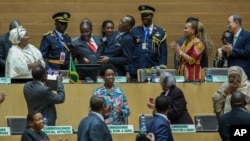The government of Burundi is satisfied by the AU decision to hold off on sending a protection force to Burundi, while the opposition feels betrayed.
African heads of state who held a summit for two days in the Ethiopian capital, Addis Ababa, could not reach a consensus on the AU recommendation to send a 5,000-member protection force to Burundi.
Burundi Foreign Minister Alain Nyamitwe, who was interviewed by Central Africa service right after the heads of state wrapped up the summit, said the Burundi government welcomes the decision to not send troops, and hopes that the idea of sending troops to Burundi is permanently put to rest.
“What is important for the government of Burundi is that African heads of states have decided not to send troops to Burundi. As a matter of fact, we articulated the wishes of the people of Burundi, who have clearly indicated through rallies across the country that they oppose the AU resolution to send troops to Burundi," Nyamitwe said.
AU resolution
"That same sentiment was echoed by the senate and the parliament. The wishes of the people are what basically prompted the government of Burundi to reject the AU’s resolution,” he said.
However, the African Union has indicated it will continue its effort to persuade the government of Burundi to accept the protection force. It announced that it would soon send a high-level delegation to Burundi. Nyamitwe said the delegation will not come to Burundi to talk about the deployment of troops, arguing that the government has time and time again spelled out that the deployment of troops is a nonstarter.
“It is true the AU representative mentioned the high-level delegation, but that is not really the way the final communiqué is worded. What we know is that those envoys will come to Burundi so we can talk about all the rumors that have been spread; as you know, so many things have been said," Nyamitwe said.
"You know that there are some reports out there that genocide was taking place in Burundi; there have also been reports of mass graves. Those are the things that we will discuss and we will show them that none of such things are taking place in Burundi,” he added.
Nyamitwe said Burundi's second vice president, Joseph Butore, who was leading the Burundian delegation to the AU summit, got a chance to brief African heads of states on the real situation in Burundi. He also said that the fact that Burundi has been elected to the African Union Peace and Security Council proves the country is a respected member of the African Union.
While the government of Burundi feels upbeat about the outcome of the summit with regard to the deployment of troops, opposition leaders feel betrayed by the “AU’s failure” to send troops to Burundi.
Opposition coalition
Leonard Nyangoma, the leader of the opposition coalition CNARED (National Council for the Restoration of the Democracy and the respect of the Constitution and the Arusha Peace Accord) spoke with the Central Africa service.
“We obviously feel once again let down by the international community. Burundians continue to suffer under a regime that has seized power unconstitutionally. However, we are not surprised by the inaction of the international community." Nyangoma said.
"Those who have a good memory know that in 1993, after the first democratically elected President Melchior Ndadaye was assassinated, some of his cabinet members who survived the killings that ensued requested that peacekeeping troops be sent to Burundi, but in vain. Peacekeeping troops were sent to Burundi 10 year later, after the Arusha Peace Accord was signed,” he said.
Nyangoma said that based on past experiences, peacekeeping troops never really protect civilians nor restore peace, arguing that they failed miserably to protect Rwandans in 1994. He said that an inclusive dialogue among Burundians is the only good chance of restoring long lasting peace in Burundi.
However, given that the Burundi government is adamant that “those who played a role in the failed coup and in the violent protest will never be allowed to participate in the dialogue,” analysts contend that the starting of real inclusive dialogue may take longer than expected.













